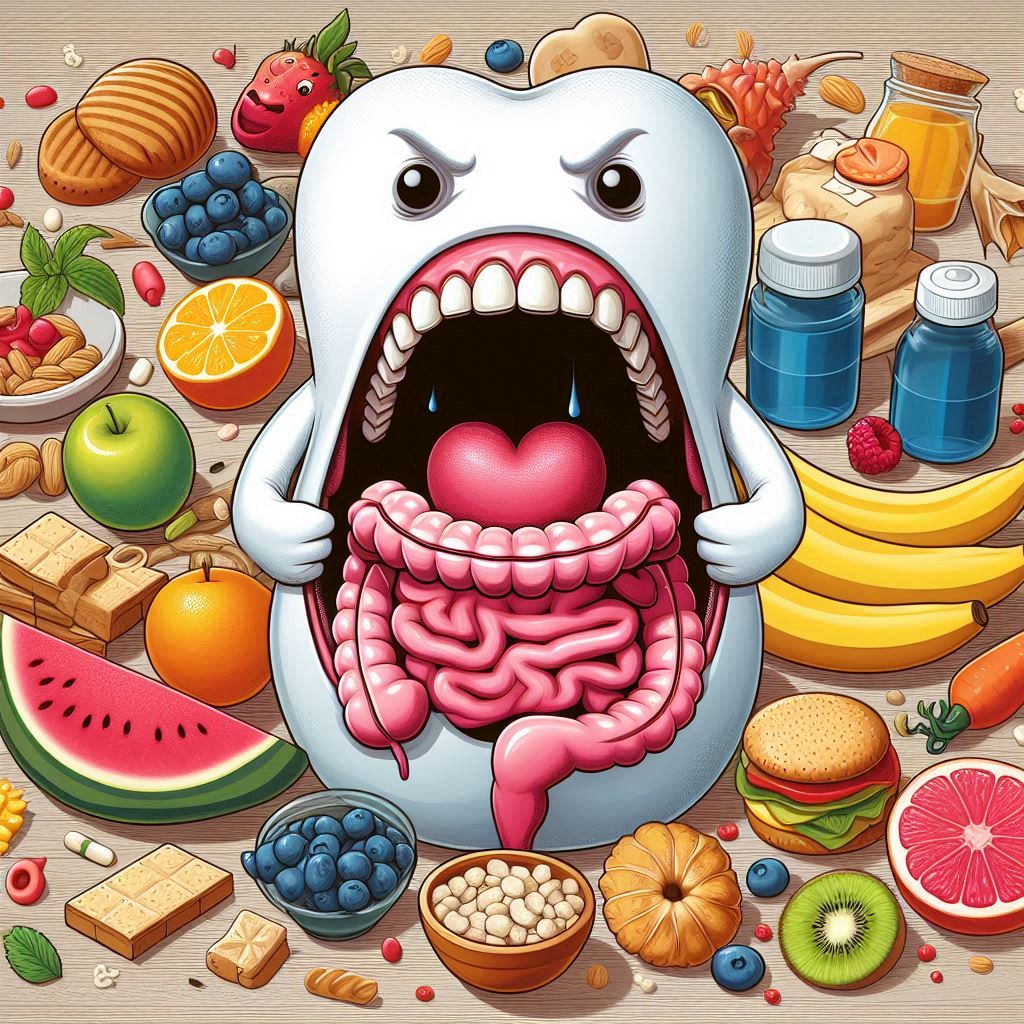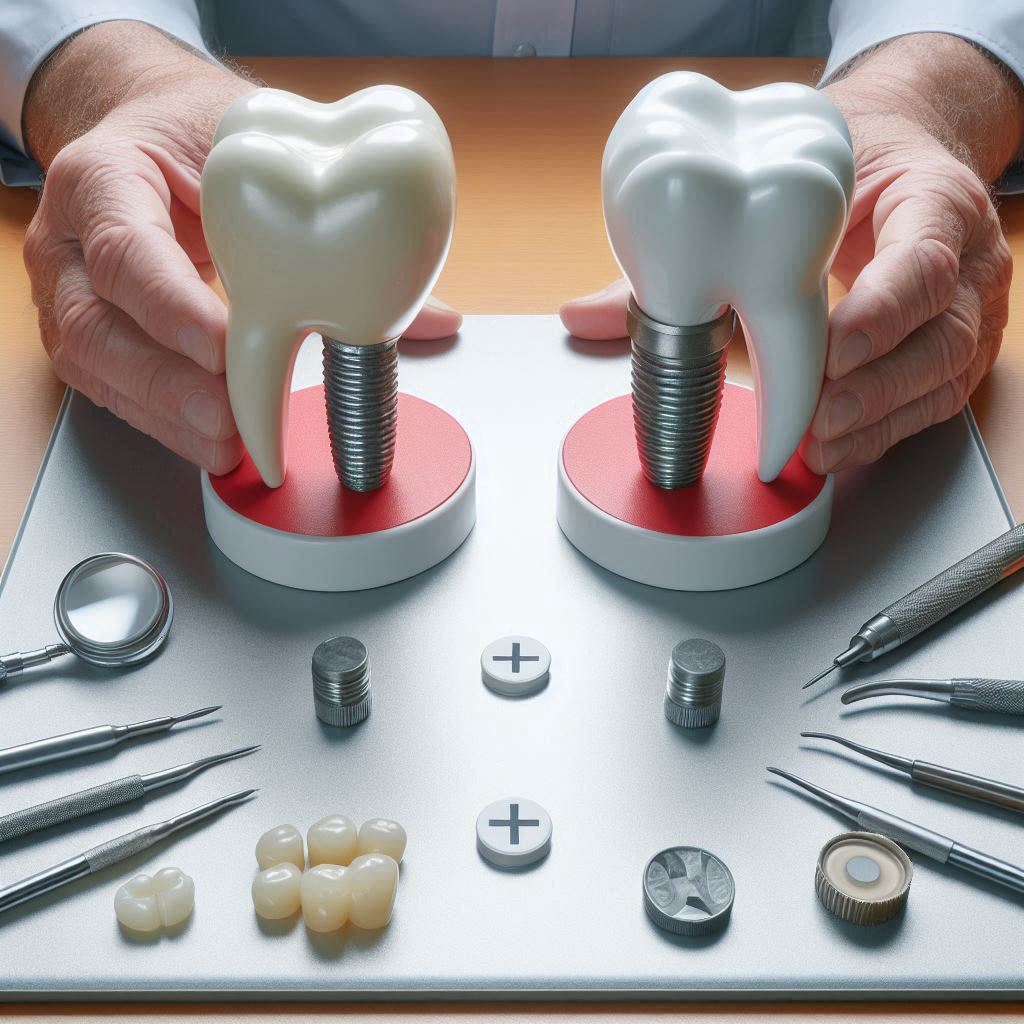Introduction
Food allergies have gained increasing attention in both the medical community and among the general public due to their rising prevalence. They are a growing concern in many countries, particularly in developed nations, where food allergies affect between 5-10% of the population. While the symptoms of food allergies are typically associated with skin reactions, respiratory issues, or even life-threatening anaphylactic reactions, the impact on oral and digestive health is often overlooked. The connection between food allergies, the immune system, and the body’s responses in the mouth and gastrointestinal system is complex and multifaceted.
This guide aims to explore the mechanisms behind food allergies and their effects on the teeth and stomach, providing a comprehensive understanding of how these conditions interconnect. Through an in-depth discussion of symptoms, the science behind allergic reactions, and long-term health consequences, we will uncover how food allergies can influence both oral and digestive health. We will also examine preventative measures, treatment strategies, and the role of healthcare providers in supporting individuals with food allergies.
Understanding Food Allergies
A food allergy is a condition in which the body’s immune system mistakenly identifies a normally harmless protein found in food as a threat. This triggers an immune response that can lead to a range of symptoms, some of which are severe and life-threatening. Understanding the underlying causes of food allergies and how they affect the body is essential for recognizing the broader implications on oral and digestive health.
The Immune System and Food Allergies
Food allergies occur when the immune system overreacts to specific proteins in food. These proteins, which are typically harmless to most people, trigger an allergic response in susceptible individuals. The immune system, in these cases, treats these proteins as if they were harmful pathogens like viruses or bacteria.
The immune response begins when food proteins are ingested. The immune system produces antibodies called Immunoglobulin E (IgE), which are specific to the offending proteins. When IgE antibodies bind to these proteins, they signal the body to release chemicals such as histamine and other inflammatory substances. These chemicals are responsible for causing the symptoms of an allergic reaction, which can range from mild to severe.
Common Food Allergens
The most common food allergens include:
- Milk (dairy allergies): Affects both children and adults, though it is more common in children.
- Eggs: Often seen in children, though many outgrow it by adulthood.
- Peanuts: One of the most common allergens in adults and children, with potentially severe reactions.
- Tree nuts: Such as almonds, cashews, walnuts, and hazelnuts.
- Shellfish: Includes shrimp, lobster, crab, and other marine invertebrates.
- Fish: Salmon, tuna, and other types of fish.
- Wheat: Often associated with celiac disease or wheat allergy.
- Soy: Common in children but can persist into adulthood.
For individuals with food allergies, even trace amounts of these allergens can trigger severe reactions, including anaphylaxis, making avoidance a critical component of management.
Food Allergies and Their Impact on Oral Health
The oral cavity is the first point of contact for allergens that enter the body. While the skin, respiratory system, and gastrointestinal tract often bear the brunt of allergic reactions, the mouth is equally susceptible. Understanding how food allergies can lead to oral symptoms is crucial for identifying potential dental complications and taking preventive measures.
Oral Symptoms of Food Allergies
Food allergies can manifest in the oral cavity in various forms. These reactions may involve the lips, tongue, cheeks, and throat. The most common oral symptoms include:
- Swelling of the Lips and Mouth: Swelling of the lips and tongue is one of the most common signs of an oral allergic reaction. This may occur within minutes after ingesting the allergenic food, and the swelling may be localized or widespread, potentially making it difficult to speak or swallow.
- Oral Ulcers: Allergic reactions can also cause the formation of painful sores or ulcers in the mouth. These sores may appear on the tongue, cheeks, gums, or roof of the mouth, and they can be exacerbated by acidic or spicy foods.
- Mouth Itching and Tingling: Some individuals with food allergies experience a sensation of itching or tingling in the mouth, particularly after consuming certain foods such as fruits, nuts, or vegetables. This sensation may be indicative of a mild oral allergic reaction or oral allergy syndrome (OAS), which occurs when certain proteins in fruits or vegetables trigger an immune response.
- Throat Tightness: The throat can also become affected, leading to discomfort, swelling, and even difficulty swallowing. In severe cases, the airway can become constricted, leading to respiratory distress and potentially life-threatening anaphylaxis.
Dry Mouth and Its Effects
Dry mouth, or xerostomia, is another common issue for people with food allergies. This condition occurs when there is insufficient saliva production, which is necessary to maintain a healthy oral environment. Saliva helps neutralize acids, cleanse the mouth, and protect against tooth decay and gum disease. Reduced saliva production increases the risk of:
- Tooth Decay: When the mouth is dry, there is less saliva to wash away food particles and neutralize acids produced by bacteria in the mouth. This can lead to an increase in plaque and bacteria, raising the risk of cavities.
- Gum Disease: Without adequate saliva, the gums are more vulnerable to infection and inflammation, leading to gingivitis or periodontitis over time.
- Difficulty Speaking or Eating: A dry mouth can also make it uncomfortable to talk or chew, particularly if the tongue or lips are swollen or sore due to an allergic reaction.
Oral Erosion and Sensitivity
Prolonged exposure to allergens, particularly in individuals with gastrointestinal reflux disease (GERD) or those who have frequent allergic reactions that affect the mouth, can lead to the erosion of tooth enamel. Acidic foods, when combined with allergens, can exacerbate the acidity in the mouth and lead to the breakdown of tooth enamel, which protects the teeth from decay.
Strategies for Managing Oral Health in Allergic Individuals
To mitigate the oral impact of food allergies, individuals should prioritize oral hygiene and make the following adjustments:
- Brushing and Flossing Regularly: Brush teeth with fluoride toothpaste and floss at least twice a day to remove plaque and food particles, especially after meals.
- Stay Hydrated: Drinking water helps promote saliva production and keeps the mouth hydrated, reducing the risk of dry mouth.
- Avoiding Allergenic Foods: The most effective way to prevent oral reactions is to avoid trigger foods, and in the case of those with severe allergies, this may also include taking medications such as antihistamines.
- Consulting a Dentist Regularly: People with food allergies should maintain regular visits to a dentist for cleanings and checkups, which are essential for detecting early signs of tooth decay or gum disease related to allergic reactions.
Food Allergies and Their Impact on Digestive Health
The gastrointestinal (GI) system is one of the most common areas affected by food allergies. Symptoms range from mild discomfort, such as bloating and nausea, to severe reactions like vomiting, diarrhea, and even anaphylactic shock. Understanding the interaction between food allergies and the digestive system is crucial for managing symptoms and preventing long-term health issues.
Gastrointestinal Symptoms of Food Allergies
Food allergies trigger a wide range of digestive symptoms, which can manifest in various ways. The immune system’s inflammatory response to food allergens can affect the entire digestive tract, from the stomach to the intestines.
- Abdominal Pain: Inflammation caused by food allergies can lead to discomfort or cramping in the stomach or intestines. This pain can vary in intensity and may be associated with bloating, distension, and indigestion.
- Nausea and Vomiting: After consuming allergenic foods, many individuals experience nausea or vomiting as the body tries to expel the offending substance. Vomiting may be accompanied by a feeling of general malaise or fatigue.
- Diarrhea: Allergic reactions in the intestines can increase motility and cause the digestive process to speed up, resulting in diarrhea. This can lead to dehydration and electrolyte imbalances, which are particularly concerning for young children and the elderly.
- Constipation: In some cases, food allergies may cause constipation, particularly when the intestines become inflamed or irritated. This may be exacerbated by medications used to treat allergic reactions, such as antihistamines.
The Role of Inflammation in the GI Tract
When the immune system reacts to food proteins, it triggers inflammation in the gastrointestinal tract. This inflammation can disrupt normal digestive processes and lead to conditions like:
- Leaky Gut Syndrome: Chronic inflammation in the intestines can damage the lining of the gut, leading to a condition known as “leaky gut.” This condition allows undigested food particles and toxins to leak into the bloodstream, potentially causing systemic inflammation and increasing the risk of autoimmune diseases.
- Gastroesophageal Reflux Disease (GERD): In some individuals, food allergies can contribute to GERD, a condition in which stomach acid frequently flows back into the esophagus. This can lead to heartburn, difficulty swallowing, and damage to the esophagus over time.
- Eosinophilic Esophagitis (EoE): This is a condition in which an allergic reaction causes the eosinophils, a type of white blood cell, to accumulate in the esophagus, leading to inflammation and difficulty swallowing. EoE is often triggered by specific food allergens.
Managing Gastrointestinal Health in Individuals with Food Allergies
Managing digestive health for individuals with food allergies involves more than just avoiding allergens. It requires a multifaceted approach that focuses on preventing inflammation, maintaining gut health, and minimizing discomfort.
- Elimination Diet: The most effective way to prevent GI symptoms is to eliminate trigger foods from the diet. This may require working with a nutritionist to ensure that nutritional needs are still met despite avoiding certain allergens.
- Probiotics and Digestive Enzymes: Probiotics can help support a healthy balance of gut bacteria, which is essential for digestion. Digestive enzymes may help break down foods and reduce symptoms like bloating or indigestion.
- Anti-inflammatory Diet: Including anti-inflammatory foods, such as omega-3 fatty acids, fruits, and vegetables, can help reduce gut inflammation. This may also involve reducing processed foods and foods that trigger inflammation, such as high-fat or fried foods.
- Medications: In some cases, medications such as antihistamines, corticosteroids, or proton pump inhibitors may be prescribed to reduce inflammation or manage symptoms like heartburn or nausea.
Long-Term Effects of Untreated Food Allergies
When food allergies go untreated or are not managed properly, they can lead to serious long-term effects on both oral and digestive health. Prolonged inflammation, tooth decay, and gut damage can result in chronic conditions that impact overall quality of life.
Chronic Inflammation and Organ Damage
Untreated food allergies can cause persistent inflammation in the oral cavity, digestive tract, and other systems of the body. Chronic inflammation is associated with:
- Tooth Erosion and Decay: The ongoing presence of allergens in the mouth can lead to dental erosion, gum disease, and tooth decay.
- Intestinal Damage: Persistent inflammation in the gut can lead to conditions such as leaky gut syndrome, chronic diarrhea, and malabsorption of nutrients.
Risk of Anaphylaxis
Anaphylaxis is a severe, life-threatening allergic reaction that can occur quickly after exposure to a food allergen. Anaphylaxis can cause:
- Difficulty Breathing: Swelling of the throat and airways, which can lead to respiratory distress.
- Shock: A sudden drop in blood pressure that can cause fainting, dizziness, and organ failure.
Without immediate treatment, such as the injection of epinephrine, anaphylaxis can be fatal. Individuals with severe food allergies should always carry an epinephrine auto-injector (EpiPen) and seek emergency medical care if they experience symptoms of anaphylaxis.
Managing Food Allergies for Better Health
For individuals with food allergies, managing the condition effectively is key to preventing both immediate and long-term complications. This requires collaboration with healthcare providers, as well as dietary and lifestyle adjustments that support both oral and digestive health.
Working with Healthcare Providers
A comprehensive management plan that involves healthcare professionals is essential for individuals with food allergies. This plan should include:
- Allergy Testing: Working with an allergist to identify food triggers and develop an avoidance strategy.
- Dietary Counseling: Consulting with a dietitian to ensure nutritional needs are met despite avoiding certain foods.
- Regular Monitoring: Regular check-ups with doctors and dental professionals to monitor for signs of allergic reactions or oral health problems.
Lifestyle Adjustments
In addition to medical management, lifestyle changes can play a significant role in minimizing allergic reactions and improving overall health:
- Exercise: Regular physical activity helps reduce stress and support immune function.
- Stress Management: Stress can exacerbate allergic reactions, so practicing stress-reduction techniques such as mindfulness, yoga, or deep breathing can be beneficial.
- Environmental Control: Reducing exposure to allergens in the home or workplace, particularly through cross-contamination prevention, can help reduce allergic reactions.
Conclusion
Food allergies can have significant effects on both oral and digestive health, leading to a range of symptoms from mild discomfort to severe, long-term complications. These allergic reactions occur when the immune system mistakenly identifies certain food proteins as harmful, triggering a cascade of immune responses that can affect various parts of the body, including the mouth and gastrointestinal tract.
Oral symptoms of food allergies can include swelling, itching, ulcers, dry mouth, and tooth sensitivity. In the digestive system, symptoms may manifest as abdominal pain, nausea, vomiting, diarrhea, or even more severe conditions like eosinophilic esophagitis or leaky gut syndrome. These reactions can disrupt normal daily functioning and contribute to long-term health issues if left unmanaged. The key to minimizing the impact of food allergies lies in proactive management. This includes avoiding known allergens, maintaining a healthy and consistent oral hygiene routine, and addressing gastrointestinal issues through diet and medication when necessary. Regular consultations with healthcare providers, including allergists, dentists, and gastroenterologists, are essential for monitoring symptoms and adjusting treatment plans accordingly.
Additionally, understanding the underlying mechanisms of food allergies can help individuals make informed decisions about their health and lifestyle. Preventive measures, such as avoiding cross-contamination, carrying emergency medication (e.g., epinephrine auto-injectors for severe reactions), and following a tailored diet, are crucial in managing food allergies effectively. Ultimately, while food allergies pose challenges, individuals who take proactive steps to manage their condition can significantly reduce the risk of complications and improve their overall quality of life. Ongoing research, increased awareness, and a collaborative approach to healthcare are essential for advancing the understanding and management of food allergies, ensuring a better future for those affected.
SOURCES
Anderson, J. E. (2021). Food allergies: Pathophysiology and management strategies. Journal of Allergy and Clinical Immunology, 147(5), 1459-1466.
Banerjee, A. (2019). Oral manifestations of food allergies: A comprehensive review. Journal of Dentistry, 46(3), 295-305.
Blom, S. E., & DeBoer, A. (2020). The gastrointestinal implications of food allergies: A closer look at the role of the gut in allergic disease. Gastroenterology Clinics of North America, 49(4), 607-617.
Carter, D. A., & Partridge, K. (2018). Dry mouth and food allergies: Investigating the link between allergies and oral health. Journal of Dental Research, 97(12), 1289-1295.
Goldman, D. L., & Galen, G. S. (2021). Food allergy and its impact on children’s dental health: Current perspectives. Pediatric Dentistry Journal, 43(2), 179-186.
Morris, A. S., & Stevens, C. J. (2019). Food allergies and their effect on the immune system: A review of clinical implications in pediatric populations. Immunology Reviews, 292(1), 84-91.
Patterson, J. R., Hernandez, R. M., & Singh, S. K. (2017). Managing gastrointestinal symptoms of food allergies: A review of current management strategies. Clinical Gastroenterology, 35(6), 547-552.
Vaughan, H. W. (2020). Chronic inflammation and food allergies: Implications for dental and gastrointestinal health. Journal of Clinical Allergy, 58(4), 353-358.
Williams, E. L., & Thompson, R. H. (2019). Food allergy and the gastrointestinal system: From symptoms to long-term health consequences. International Journal of Clinical and Experimental Medicine, 42(8), 1234-1242.
Zhao, Y., & Zhang, Y. (2022). Oral allergy syndrome: A hidden impact of food allergies on the oral cavity. Allergy and Asthma Proceedings, 43(3), 175-182.
HISTORY
Current Version
January 22, 2025
Written By:
SUMMIYAH MAHMOOD




